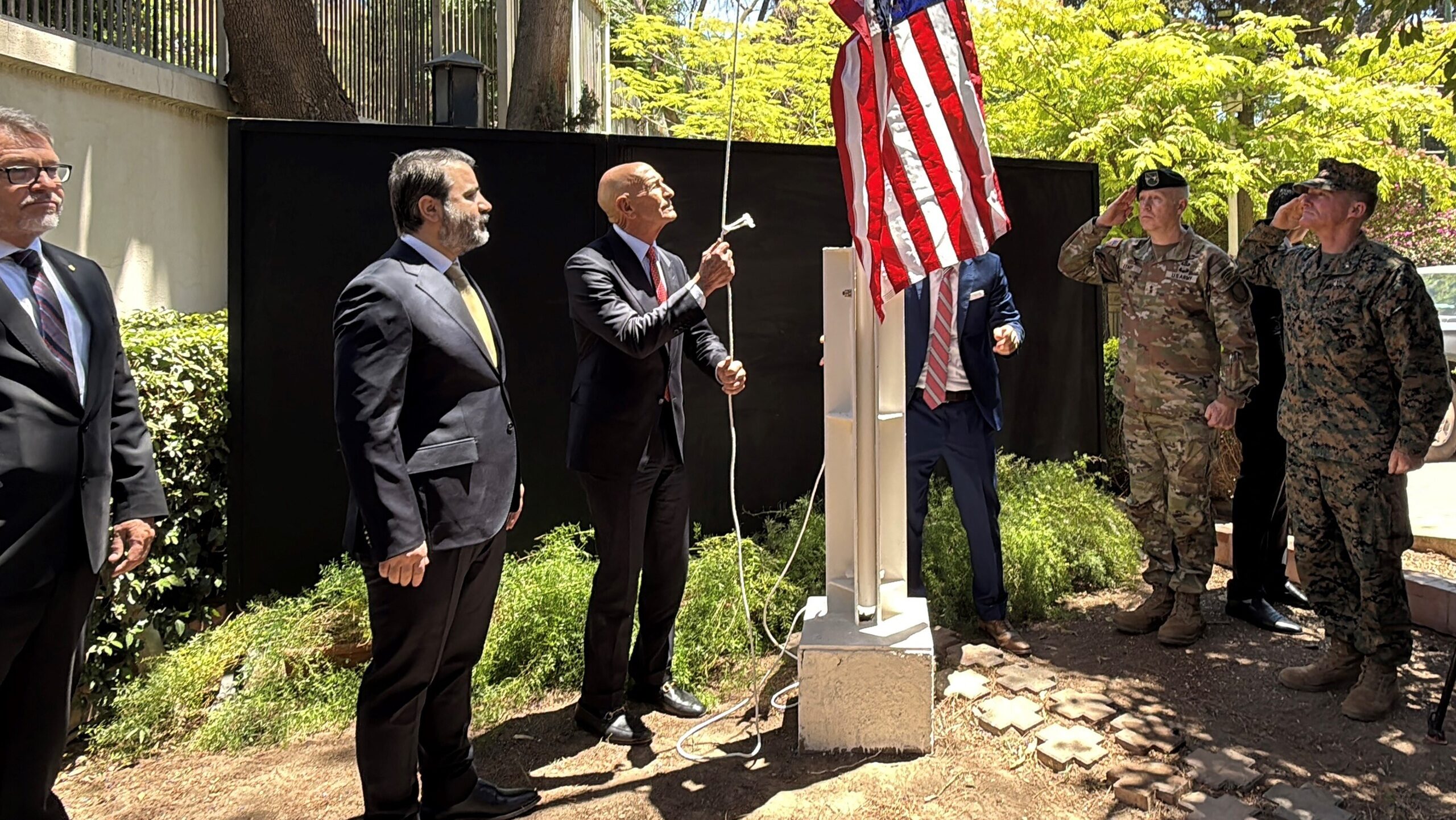US Raises Flag in Damascus, Signaling Major Policy Shift
[Damascus] The United States raised its flag over the residence of its special envoy in Damascus last Thursday, marking the first public diplomatic presence in Syria in more than a decade. The move, which took place without an official announcement on reopening the embassy or appointing a new ambassador, is widely seen as a major shift in US policy toward Syria.
This symbolic gesture coincided with the lifting of long-standing US sanctions on Syria and the signing of significant economic agreements, all witnessed by senior officials. US envoy Tom Barrack, who also serves as ambassador to Turkey, presided over the event alongside Syria’s new foreign minister, Asaad al-Shaibani. Media outlets published footage of the flag-raising ceremony.
Washington’s relations with Damascus have been strained for over a decade. In 2012, the US closed its embassy and withdrew all diplomatic staff in response to escalating violence and the Syrian government’s refusal to engage on security concerns. That decision followed the Assad regime’s brutal suppression of peaceful protests during the 2011 Arab Spring, which devolved into a civil war claiming hundreds of thousands of lives.
For years, Washington supported the Syrian opposition and imposed sweeping sanctions on President Bashar Assad’s regime while providing humanitarian aid. That policy remained in place until Assad’s fall last year in a surprise offensive led by Ahmed al-Sharaa, a controversial figure and former leader of Hay’at Tahrir al-Sham, an organization designated as a terrorist group by the United Nations, United States, European Union, Russia, Turkey, and others.
Give the gift of hope
We practice what we preach:
accurate, fearless journalism. But we can't do it alone.
- On the ground in Gaza, Syria, Israel, Egypt, Pakistan, and more
- Our program trained more than 100 journalists
- Calling out fake news and reporting real facts
- On the ground in Gaza, Syria, Israel, Egypt, Pakistan, and more
- Our program trained more than 100 journalists
- Calling out fake news and reporting real facts
Join us.
Support The Media Line. Save democracy.
During his visit, Barrack met with top Syrian officials, including transitional President al-Sharaa, Defense Minister Marhaf Abu Qasra, and intelligence chief Hussein Salameh. He also attended the signing of a $7 billion deal for electricity supply to Syria through Turkish and Qatari firms.
In a speech following the event, Barrack commended US President Donald Trump and Secretary of State Marco Rubio, calling the removal of sanctions a “bold step.” He said, “This new phase is grounded in regional cooperation and economic openness.” He also praised Syria’s new leadership as “brave and remarkable.”
Secretary Rubio confirmed the embassy remains closed “purely due to security concerns,” hinting at a potential reopening depending on future conditions. The broader policy shift comes as the US seeks to reassert influence in the Middle East without engaging in additional military interventions. According to diplomatic sources, Saudi Arabia and Turkey were instrumental in convincing Washington to back Syria’s transitional government.
Their efforts bore fruit during a high-profile meeting between President Trump and al-Sharaa in Riyadh, a clear signal of changing alliances in the region. While Washington is moving toward a more pragmatic stance, many in the US remain wary of al-Sharaa’s past ties to designated terrorist groups.
The presence of the US flag in Damascus suggests more than a simple thaw in relations. It signals Washington’s willingness to recalibrate its engagement with Syria, aligning with a shifting regional balance of power. But the response from Iran and Russia—key allies of the former Assad regime—remains uncertain. The move is also likely to provoke political debate in Washington, particularly given the controversial nature of Syria’s new leadership.
Whether this leads to full diplomatic normalization or stalls under pressure from domestic or international critics will depend largely on political and security developments on the ground in Syria.



